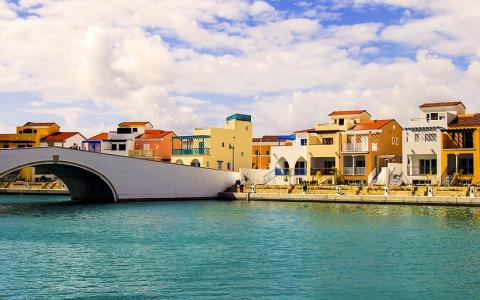
Bank’s “thought experiment” reveals the deep economies that accompany Big Tech’s vast scale. Time to get the corporate needle moving.
Jeff Bezos hasn’t really killed a lot of commercial categories lately. The investment bankers at Saxo have a suggestion: why not disrupt the global landscape?
And while Saxo officially says it would be “outrageous” for Bezos to deploy Amazon’s resources to take over a country (they recommend Cyprus), a strategic acquisition actually makes a lot of sense.
Amazon and its Silicon Valley peers are now too big to maintain their growth rates without making outrageous moves. Meanwhile, most of the world’s governments are too small to effectively tell Bezos what to do.
People like to contemplate what it would mean if Amazon bought a bank, an insurance carrier, a hospital network. They’re betraying a lack of vision.
“Getting into banking” isn’t going to move the Amazon needle any more than the Apple Card or Apple Pay shifted the giant of Cupertino back into racing gear.
What Bezos needs is to take over an entire banking haven, which is where Cyprus steps up.
Economies of Leverage
Amazon is on track to generate $450 billion in direct economic activity next year. While that’s not enough to qualify for a chair at the next G-7 meeting, if revenue were GDP the company would outrank all but 25 of the world’s 190 nations.
There’s $68 billion in cash to play with. In theory, Bezos could use it to pay a dividend, buy back shares or reinvest in the next growth stage.
Bolt-on acquisitions are scarce at this scale and they aren’t terribly exciting. Would Amazon want to buy Docusign and crowd Microsoft’s productivity turf?
Dell or Hewlett Packard? No way. Old news.
Uber or Square would be interesting but they’re a little too big at this point. Admittedly, Palantir would be a great fit for Amazon’s cloud operation, if they were actually willing to sell.
But even then, the numbers require a lot of vision. The last time a Bezos acquisition stretched beyond his known comfort zone was Whole Foods three years ago, when Amazon wasn’t even a third its present size.
At the time, bolting on around $20 billion a year in sales meant boosting the growth curve about 15 percentage points. It was worth pushing the button then, and as grocery delivery lives up to its promise it’s an even better deal now.
While Uber has roughly the run rate Whole Foods had then, adding that cash flow would at best boost Bezos 3 percentage points in the coming year while depleting the company’s war chest. The other companies we’ve mentioned are practically tuck-in acquisitions, snacks.
Barring a breakthrough or unlikely marriage of trillion-dollar equals, Amazon is just never going to make a meaningful merger in Silicon Valley again. That’s why people who know the company dream about a lateral leap to banking or healthcare.
After all, once you disrupt your first retail category, everything else in that vertical is incremental. You need new trillion-dollar worlds to conquer.
So there’s banking. Amazon can go on a $60 billion bender in fintech, buy just about everything in the space and then take on Fidelity and Schwab head to head.
Or Bezos can stretch a little and buy an asset manager like BlackRock. In theory the technology unleashes dramatic market share capture and the other businesses protect the overall margins.
Think of an aggressive robo with infinite pockets. It can offer negative-fee accounts, literally paying investors to move their wealth and starve rivals.
Or do it with healthcare. We know Amazon is getting serious about pharmacy. The drugstores and the entire pharma supply chain is on notice now.
But even this is small scale, which is where Cyprus comes back to the screen.
From Company To Country
The island of Cyprus has been sidelined across much of the modern financial era, left on the margins of the euro zone and drifting farther from the core in the 2008-9 crisis.
Officially, the entire country generates about $25 billion a year in economic activity, which is only a fraction above Whole Foods.
And a lot of that money flows in through quasi-licit financial channels. Cyprus is known to be an offshore haven with about $60 billion parked in its banks.
Tax revenue comes in around 40% of GDP and the budget roughly balances in any typical year. Amazon would be extremely welcome to boost that base with a warehouse, fulfillment center or even a regional headquarters.
That’s all it takes. Invest $10 billion a year in the country and suddenly you have a controlling stake in the economy.
Amazon currently pays $3 billion in annual income tax and the country’s 12.5% flat corporate rate will save it about $500 million a year. With what looks like a profit spike looming, a move would pay for itself within a decade or two.
From there, the giant can call the shots. If you want to bend the public discourse and policy, you can probably do that too.
Write new banking rules. Serve the world’s wealthy from a single low-cost location.
Think about what the big banks did in South Dakota. Once the local rules shifted, the preferential jurisdiction of choice moved with it.
It’s how global havens happen. Big money recognizes an opportunity to shift to a lower-cost regime and jumps. Other players follow.
Even as we speak, business is flowing out of Silicon Valley and Wall Street into Texas and Florida, or even as far afield as New Zealand.
Bezos is happy right now in Washington State, but think of how much happier he’d be in a place that doesn’t even charge capital gains tax when he sells his shares.
The U.S. economy is only $22 trillion right now. Amazon is a full 2% of it right now.
What would they do with their own country? That’s for them and their bankers to decide. Maybe Saxo is really auditioning.



